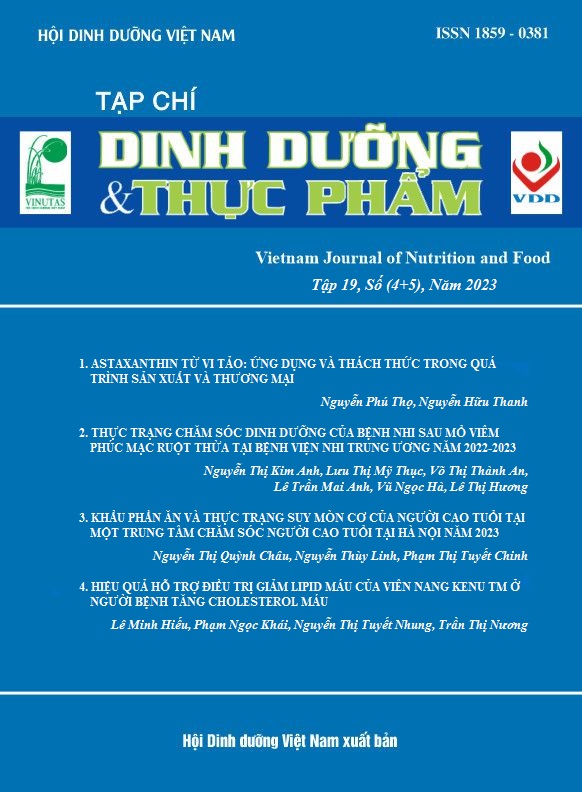KNOWLEDGE OF CARE FOR MOTHERS WITH CHILDREN WITH CONGENITAL HEART DISEASE AT THAI BINH PEDIATRIC HOSPITAL
Main Article Content
Abstract
Aims: To describe mothers' knowledge about nutritional care for children under 5 years old with congenital heart disease.
Methods: A cross-sectional study was conducted on 102 mothers about the knowledge of nutritional care for children under 5 years old with congenital heart disease at Thai Binh Pediatric Hospital in 2022.
Results: Mothers' knowledge of nutritional care for children with congenital heart disease was still very limited, with only 4,9% of mothers having good knowledge. Mothers' knowledge in the fields of nutritional care for children with congenital heart disease, including factors determining nutritional status, nutrition for children, anemia and iron deficiency, and physical activity, the respective proportions were 7,8%; 10,8%; 19,6% and 9,8%.
Conclusion: Mothers' knowledge of nutritional care for children with congenital heart disease was very limited, both in general knowledge and knowledge in 4 areas of child care: factors that determine nutritional status, nutrition for children, iron deficiency anemia, and physical activity.
Keywords
Congenital heart disease, children, care knowledge, Thái Bình Children's Hospital.
Article Details
References
2. Abd MA, Boshra EA, Mohammed A, et al. Nutritional Education Intervention for Mothers with Children Having Congenital Heart Defects.World Journal of Nursing Sciences. 2016;2(3):153-163.
3. Bộ Y Tế. Dinh dưỡng điều trị bệnh nhiễm khuẩn, Nxb Y học, Hà Nội, 2019.
4. McNeil J, ChaseLigon John A, Hulten Kristina G, et al. Staphylococcus aureus Infections in Children With Congenital Heart Disease, Journal of the Pediatric Infectious Diseases Society. 2013;2(4):337-344.
5. Sabzevari S, Nematollahi M, Mirzaei T, et al. The Burden of Care: Mothers' Experiences of Children with Congenital Heart Disease.Int J Community Based Nurs Midwifery. 2016;4(4):374-385.
6. Kuwata S, Iwamoto Y, Ishido H, et al. Duodenal tube feeding: an alternative approach for effectively promoting weight gain in children with gastroesophageal reflux and congenital heart disease.Gastroenterol Res Pract. 2013:181604.
7. Weesner KM, Rosenthal A. Gastroesophageal reflux in association with congenital heart disease.Clin Pediatr. 1983;22(6):424-426.
8. Briassoulis GC, Zavras NJ, Hatzis MDTD. Effectiveness and safety of a protocol for promotion of early intragastric feeding in critically ill children, Pediatr Crit Care Med. 2001;2(2):113-121.
9. Tume LN, Balmaks R, Da Cruz E, et al. Enteral Feeding Practices in Infants With Congenital Heart Disease Across European PICUs: A European Society of Pediatric and Neonatal Intensive Care Survey. Pediatric Care Med. 2018;19(2):137-144.
10.Tume LN, Valla FV, Joosten K, et al. Nutritional support for children during critical illness: European Society of Pediatric and Neonatal Intensive Care (ESPNIC) metabolism, endocrine and nutrition section position statement and clinical recommendations. Intensive Care Med. 2020;46(3):411-425.
11.Kassebaum NJ, Jasrasaria R, Naghavi M, et al. A systematic analysis of global anemia burden from 1990 to 2010. Blood. 2014;123(5):615-624.
12.Lozoff B, Georgieff MK. Iron deficiency and brain development.Semin Pediatr Neurol. 2006;13(3):158-165.
13.Arvidsson D, Slinde F, Hulthen L, Sunnegardh J. Physical activity, sports participation and aerobic fitness in children who have undergone surgery for congenital heart defects. Acta Paediatr. 2007;98(9):1475–1482.
14.Kao CC, Chang PC, Chiu CW, et al. Physical activity levels of school-age children with congenital heart disease in Taiwan.Appl Nurs Res. 2009;22(3):191-197.
15.Stefan, Mark A, Hopman, Wilma M, Smythe, John F. Effect of Activity Restriction Owing to Heart Disease on Obesity. Archives of Pediatrics & Adolescent Medicine. 2005;159(5):477-481.
16.Chessa M, De Rosa G, Pardeo M, et al. What do parents know about the malformations afflicting the hearts of their children?.Cardiol Young. 2005;15(2):125-129.
17.Mohammed L. (2015). Parental knowledge, attitudes and practice towards their children′s congenital heart disease and its impact on their growth in sudan heart centre. Doctoral dissertation, University of Khartoum.
Similar Articles
- Thi Nam TRAN, Bao Ngoc TRINH, KNOWLEDGE OF FOOD SAFETY IN STREET FOOD OF BACHELOR OF NUTRITION STUDENTS OF HA NOI MEDICAL UNIVERSITY IN 2017 , Vietnam Journal of Nutrition & Food: Vol. 13 No. 4 (2017)
You may also start an advanced similarity search for this article.


